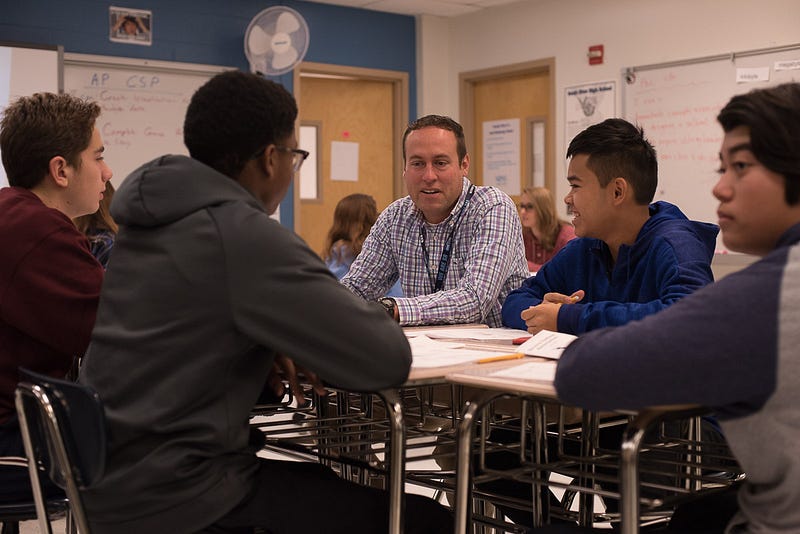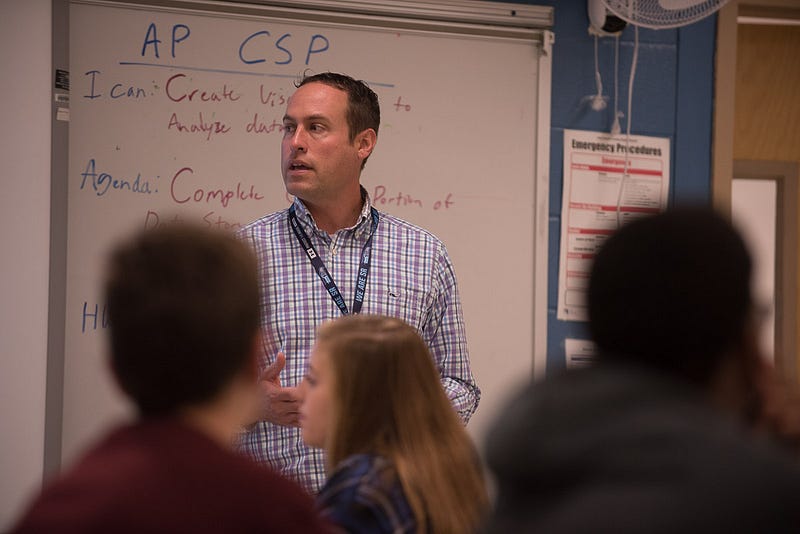“Students Need to Be Something Other Than Just a Student.”
An interview with 2017-18 Maryland Teacher of the Year Josh Carroll.

The 2017–18 Maryland Teacher of the Year is Josh Carroll, a STEM and English teacher at South River HS and a member of the Teachers Association of Anne Arundel County. ActionLine recently caught up with Josh to learn about what inspires and guides him as a teacher.
In your teaching, do you think back to a teacher you had as a student who inspired you, or whom you try to emulate?
My coaches in high school made a huge impact on me, and they taught me a lot about responsibility, accountability, work ethic, team work, and how we treat each other and what our common goals are. I use a lot of what I learned as an athlete in the classroom. I coach three sports at South River, and I use those lessons not just on the cross country course or on the track, but in the classroom. I try to take what I learned as a student athlete as far as responsibility, accountability, and holding kids to a high expectation regardless of how I’m working with them.
What role do you think athletics play in preparing students for their lives post-graduation?
Students need to be something other than just a student. I hope that whether they find themselves involved with athletics, with clubs such as robotics, or with dance, music, or the arts — with multiple ways to express themselves, a uniquely whole person develops.
I know for a lot of the kids that I work with, seeing them change as a person through sports is very powerful — watching them become better organizers, better time managers, and better, more dedicated students. I see that in students who make those same types of commitments through other extracurricular activities, and I think that’s the piece that’s really important to me. We always hear about what’s the first to be cut — arts, athletics, sports, music, dance — and yet those are so key in developing the whole student. I really feel passionate that we need those programs in our schools.
You place an emphasis on project-based learning (PBL) in your teaching. How has that approach helped your students be successful in mastering the material?
I have my students collaboratively seated so that at any given moment I can turn a lesson into a PBL. I feel that’s valuable to our students because we don’t work in isolation. As they continue on through college, into their internships, and into their careers, they’re going to need to have that skill set, to not only be able to effectively work independently, but to work collaboratively with co-workers, with peers, and with their fellow interns.

If you had a magic wand and could change one thing about our public school system, what would it be?
In some ways there’s a lot of answers I want to give you, and in other ways we do things very well. And I do want to stress that our public school systems do things very well. If I had a magic wand, there would be fewer standardized assessments for kids. I understand the value in them because we use that data to track student progress — to see that they’re acquiring skill-sets that we want them to have, that they need to have, to be successful in their careers — but right now we’re putting too much stress on our students through testing. I see that in their behaviors, I see that in their physical appearance, and I see that in how children have changed over my 19-year teaching career. There’s too much.
Is there any advice that you would have, looking back, for people who are just starting their careers about what they can do in those first few years to get through, to get to the point where they’re feeling comfortable, successful, and really making a difference in their careers?
I was one of those teachers…after two years I was done. I loved what I did, but I was so physically exhausted every day, and emotionally drained, I wasn’t sure if I wanted to stay with it. I was very lucky to have a principal at Glen Burnie who was proactive in helping, and found me a mentor. I think that’s a key point we have to bring to new teachers: not just an advisor who’s in the building one day a week, but somebody who can also really understand your content, and I was so lucky to have a mentor in the English department who was able to help me formulate strong lessons. I was teaching books I had never read before and I was a day ahead of the students. I know that happens in other disciplines as well. I see new teachers come in and being asked to teach courses that they themselves aren’t too versed in, but it falls under the umbrella of a social studies, or a technology. Having a mentor in your department is incredible. Someone who every day as that resource was a great help to me, and helped me transition.
The other thing we have to do for our newest teachers is to really be considerate of what types of classes they are teaching. Are they only being tasked with the most challenging courses, or classes, where every single day is a struggle — or are we allowing them to have that time to see a variety of classes, some of the stronger classes that help them fine-tune and develop better classroom management skills, and better, more effective ways to deal with a variety of students? I know when I was hired, the classes that I was assigned were the only classes that were left. In other words, the classes no one else wanted. That was incredibly challenging. As I said, after year two, the principal really became involved, and I had a new department chair who was wonderful and she really helped me — and not just me, but the other teachers in our department to connect better.
So how do we keep mountains of teachers from fleeing the profession every year? We need to provide them with better mentors, we need to provide them with better class schedules or class schedules that are effective for them, and we need to make sure that we really do provide them with the tools that they need to be successful.

